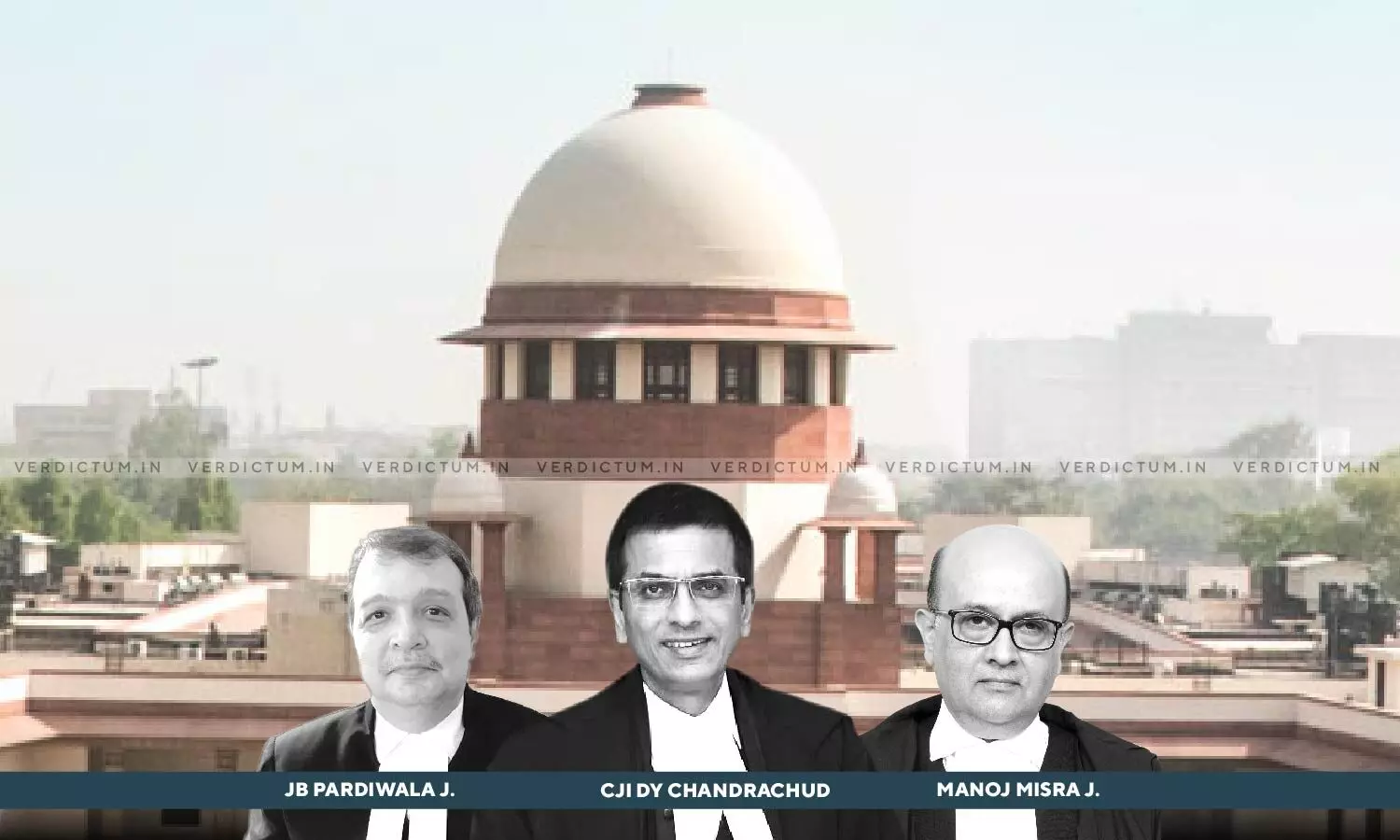
'Bulldozer Justice' Simply Unacceptable Under Rule Of Law: SC Directs UP Govt To Pay ₹25L Compensation For Illegal Demolition Of Senior Journalist's House
 |
|The Supreme Court directed the the Uttar Pradesh Government to pay compensation of Rupees 25 lakhs to a senior journalist for unlawful demolition of his ancestral residential house.
The Court remarked that 'bulldozer justice' is simply unacceptable under the rule of law.
A senior journalist, Manoj Tibrewal, had approached the Apex Court complaining of the unlawful demolition of his ancestral residential house and shop situated in Maharajganj District of Uttar Pradesh.
The Bench comprising Chief Justice D.Y. Chandrachud, Justice J B Pardiwala and Justice Manoj Misra observed, “Bulldozer justice is simply unacceptable under the rule of law. If it were to be permitted the constitutional recognition of the right to property under Article 300A would be reduced to a dead letter. Officials of the state who carry out or sanction such unlawful action must be proceeded against for disciplinary action. Their infractions of law must invite criminal sanctions. Public accountability for public officials must be the norm. Any action in respect of public or private property must be backed by due process of law.”
Advocate Manju Sharma represented the Petitioner and Advocate Anuvrat Sharma represented the Impleader.
In the year 2012, the road on which the petitioner’s house was situated was notified as a national highway (National Highway No. 730). Subsequently,Government of India sanctioned the widening of the existing road. It was presented in the counter affidavit that after identifying the right of way out of the total sanctioned length of 21.120 km, about 4 kilometers of the stretch fell within Maharajganj town. It was alleged that the petitioner was one of several persons who had encroached upon the land of NH 730. According to the State, he had been directed to remove the encroachment.
It was also alleged that the mother of the petitioner made an application to the District Magistrate requesting him not to demolish her house. Thereafter, the Team removed the encroachment. The petitioner also moved a complaint before the National Human Rights Commission.The Collector stated that the brother of the petitioner had consented for the demolition of property to the extent of his share. The findings of the NHRC indicated that there was no justification for the demolition beyond the 3.70 meters. The first report of the NHRC was followed by an order whereby a recommendation was issued to the Chief Secretary, Government of Uttar Pradesh to pay a compensation of Rs 5 Lakhs to the petitioner and his family for the loss caused to them.
The Bench took note of the fact that the State of Uttar Pradesh produced no document to establish the original width of the State Highway which was notified as NH 730, a National Highway. Moreover, the demolition was preceded only by a Munadi announcement(announcement by drums). There was no written notice; and no disclosure of the basis of demarcation or the extent of the demolition to the occupiers. Even in respect of the area allegedly encroached no due process was followed and a written notice was not issued.
“From the above facts that have emerged, based on very disclosures made by the State of Uttar Pradesh, it is clear that the demolition was high-handed and without the authority of law”, the Bench said while also adding, “In any case, such high-handed and unilateral action by the State Government cannot be countenanced. Justice through bulldozers is unknown to any civilized system of jurisprudence.”
The Bench also proposed to lay down certain minimum thresholds of procedural safeguards which must be fulfilled before taking action against properties of citizens. It was observed that the state must follow due process of law before taking action to remove illegal encroachments or unlawfully constructed structures. Bulldozer justice is simply unacceptable under the rule of law.The Apex Court also laid down guidelines to be followed by the State or its instrumentalities before acting in pursuance of a road widening project.
Thus concluding that the entire process which was followed by the State was high handed, the Bench ordered, “The State of Uttar Pradesh is directed to pay the petitioner compensation in the amount of Rs twenty-five Lakhs, as an interim measure.”
The Bench also asked the Chief Secretary of the Government of Uttar Pradesh to take suitable action including penal measures to ensure accountability of individual officials who have acted in violation of law. Thus disposing of the petition, the Bench ordered the Disciplinary proceedings to be completed within 4 months of initiation.
Cause Title: In Re Manoj Tibrewal Akash [Neutral Citation: 2024 INSC 863]
Appearance:
Petitioner: Advocate Manju Sharma
Impleader: Advocate Anuvrat Sharma